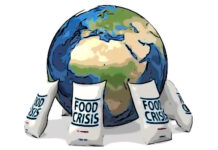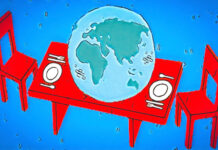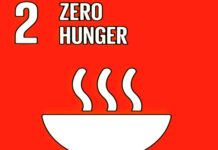The war in Ukraine is drastically affecting global food security, which is already severely destabilized by the consequences stemming from the Covid-19 health emergency, environmental disasters due to climate change, as well as the continuation of some historic conflicts in various parts of the world, Syria and Yemen, first and foremost.
Even before the Russian invasion, global food prices had reached all-time highs. With the start of the war, the cost of all commodities in March alone further increased by about 12.6 percent, compared with February 2022.
War in Ukraine, price hikes on food and energy
After more than two months of conflict, the Food and Agriculture Organization of the United Nations (FAO) reports that food prices are 34 percent higher than in the same period last year and have reached an all-time high since the index was established in 1990.
According to Ayhan Kose, director of the World Bank’s Prospects Group, ”because of the war in Ukraine, commodity markets are experiencing one of the largest supply shocks in decades. The resulting increase in food and energy prices is taking a significant human and economic toll and is likely to halt progress in poverty reduction. Rising commodity prices will exacerbate already high inflationary pressures around the world‘. (1)
Conflict and agricultural production
Russia and Ukraine are among the largest commodity-exporting nations in the world, holding control of agricultural products, natural gas, oil and metals. Together they provide 30 percent of the world’s wheat and barley, one-fifth of the world’s corn, and more than half of the world’s sunflower oil.
With the start of the war, planting, harvesting and exporting were disrupted by lack of fertilizer, shortage or absence of fuel supplies, port closures and military activity.
At least one-third of the land normally used for spring crops, such as corn and sunflower, is at risk of not being sown. In addition, about 40 percent of the wheat sown last fall may be lost, being in regions devastated by the ongoing conflict.
The global fertilizer supply is also likely to be impacted. About 10 percent of nitrogen production and phosphate exports come from Russia/Ukraine, and nearly 31 percent of global potash capacity is in Belarus/Russia.
Natural gas
Gas and energy prices in Europe have risen again, up more than 120 percent since mid-February. Russia supplies 30%-40% of the continent’s gas, and natural gas accounts for 20% of Europe’s total energy needs.
European gas prices are estimated to be two times higher in 2022 than in 2021, while coal prices will rise by 80 percent. Prices at all-time highs.
Oil
According to the World Bank, in 2022 due to trade and production blockades related to the war in Ukraine, the price of Brent crude oil could average $100 per barrel, the highest level since 2013, an increase of more than 40 percent over 2021.
Consequences for food safety
The current crisis could unleash devastating effects on the global economy and business recovery, both of which have already been severely slowed by the pandemic.
The most vulnerable communities, especially young women and children, who depend on supplies of grain and raw materials from the two conflict countries, will pay the price for this dramatic situation.
The situation is already particularly bad in the Horn of Africa, in countries such as Ethiopia, Kenya and Somalia. Millions of people are struggling with the macroeconomic impact of the Covid-19 pandemic, as well as the locust invasion, the most severe in 70 years, which has destroyed crops in all regions, already suffering from a devastating drought that has exacerbated food and water shortages.
Last week, the World Food Program announced that by 2022, more than 20 million people living in the Horn of Africa could go hungry, due to the combined effects of the war in Ukraine and contingent socio-environmental issues.
Potential permanent impacts on children
The Standing together for nutrition consortium estimates that by 2022 there could be as many as 13.6 million more wasted children and an additional 141 million people, adding to the 3 billion people who already in 2019 could not afford a healthy diet. (2)
The poorest households are coping with rising prices by switching to cheaper and less nutritious foods, resulting in the risk of life-threatening forms of malnutrition, including emaciation, reduced physical growth and cognitive development.
Dr. Zulfiqar Bhutta, co-director of the Center for Global Child Health, The Hospital for Sick in Toronto, recently said: ‘In view of the enormous adverse exposures during pregnancy and the early childhood period, some of the consequences on children will be felt for years to come; the impacts on fetal growth, perinatal and early childhood nutrition may likely have long-term consequences for human health and development that far outweigh anything currently visible‘. (3)
Urgent actions
World leaders of the nutrition of Standing Together for Nutrition (ST4N), a multidisciplinary consortium of more than 35 experts in nutrition, economics, food and health systems, and the movement Scaling Up Nutrition (SUN), which supports the nutrition goals of 65 SUN countries, believe the following actions need to be taken immediately by governments:
– Reduce unnecessary trade restrictions and domestic hoarding to enable greater accessibility of essential nutritious foods,
– protect the most vulnerable groups with safety net programs, such as food stamps aimed at improving nutrition,
– national nutrition budgets should be ring-fenced to continue providing essential nutrition support, including nutrition services for women and children, particularly during pregnancy and the first 1,000 days of life,
– honor their financial commitments for nutrition and refrain from reallocating budgets,
– invest more in more robust data monitoring systems to better target interventions,
– Implement the use of resources for humanitarian assistance to address both growing hunger and malnutrition. (4,5)
Likewise, preventing a malnutrition crisis and the resulting intergenerational losses of future productivity and human capital will require immediate investment, innovative financial schemes, and action by all governments, donors, the United Nations, and political support from the G7 and G20 global forums.
Resilience and sustainability of food systems as a guarantee for the future
The current scenario is showing the extreme vulnerability of a globalized food system incapable of guaranteeing the principles of security and safety food and confirms the need to equip itself, as soon as possible, with a strategy to accelerate the transition of the agri-food system to the issues of resilience and sustainability.
Resilience understood as a gradual decrease in European agriculture’s dependence on third-country imports and the identification of diversified import sources and market outlets through a sound multilateral and bilateral trade policy.
For a resilient future toward full food self-sufficiency, it will also be necessary to implement measures that shorten the production chain, bringing the producer closer to the consumer through a renewed focus on the local area.
Sustainability Food understood as economic and social security of availability of food supplies (food security) and as the sanitary safety of the same (food safety) will have to involve increasing use of innovation to help increase yields in a sustainable way, such as precision agriculture, new genomic techniques, improved nutrient management, integrated pest management, and biological alternatives to chemical pesticides.
It is never too late to save a generation of children from the devastating effects of malnutrition and ensure a better future for them.
Elena Bosani
Cover image from World Food Programme (WFP). Global Report on Food Crises – 2022. 4.5.22
Notes
(1) M. Ayhan Kose (worldbank.org), https://www.worldbank.org/en/about/people/m/m-ayhan-kose
(2) Standing Together for Nutrition (ST4N), https://www.standingtogetherfornutrition.org
(3) Standing Together for Nutrition (ST4N) (healthdata.org), https://www.healthdata.org/about/zulfiqar-bhutta
(4) Standing Together for Nutrition – Micronutrient Forum, https://micronutrientforum.org/standing-together-for-nutrition-2/
(5) Working together in the fight against malnutrition in all its forms (scalingupnutrition.org), https://scalingupnutrition.org
Lawyer in Milan and Frankfurt am Main. An expert in family, juvenile and criminal law, she is now enrolled in a university master's programme in food law








